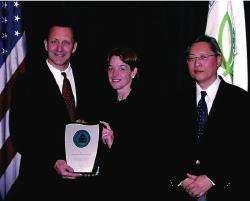York waves HVACR flag in climate-protection award scheme

York International’s director of marketing applications Bill Dietrich (left) and Tony Digmanese, director of industry relations, receive the 2005 Climate Protection Award of the US Environmental Protection Agency from Kathleen Hogan, director of EPA’s Climate Protection Partnerships Division.
York International claims to be the only HVACR company to have won a 2005 Climate Protection Award from the US Environmental Protection Agency. The company was recognised for its pioneering work and ongoing development of energy-saving technologies applied to chillers — specifically electronic variable-speed drives, with their dramatic energy-saving potential. York was the first manufacturer to introduce and promote the application of variable-speed drives to centrifugal chillers, demonstrating that they are robust and reliable. VSD technology has evolved from large, expensive floor-mounted drives to compact devices factory mounted on the chillers themselves. The application of VSDs typically reduces the energy consumption of a centrifugal chiller by 15 to 20%, with a significant effect on carbon-dioxide emissions. Andrew Layland, director for field sales for the UK and Ireland, said ‘We are proud to receive this recognition by the US EPA. With the ongoing development of existing and new technologies, York will further contribute to the protection of the environment.’
Related links:








